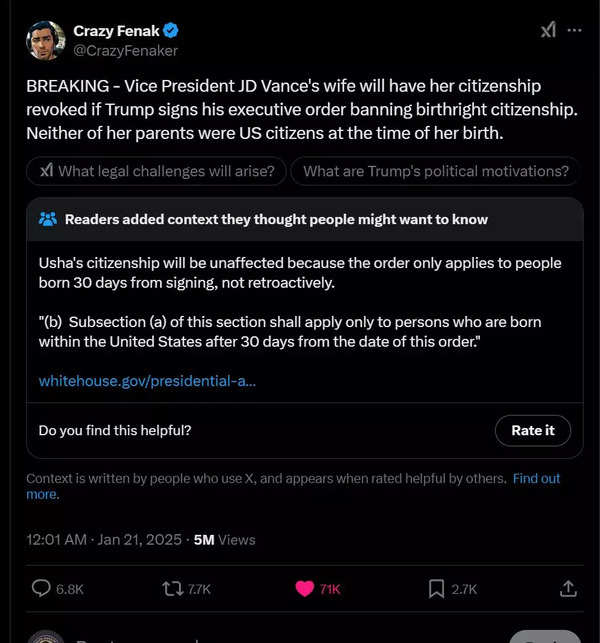On Tuesday, a Twitter handle claimed that JD Vance’s family Usha Vance may lose her citizen since her kids weren’t US residents at the time of her baby. The theory comes after Donald Trump’s recent order in which he would overturn years of jus soli ( birthright by soil ) citizenship for children born to illegal immigrants or when the person’s mother was “lawful but temporary”.
Usha Vance’s kids, Krish and Lakshmi Chilukuri, immigrated to the United States from Andhra Pradesh, India, in the 1980s. But, publicly available data does not specify the exact time when they became US citizens. Both have established powerful jobs in the U. S. ; Krish Chilukuri is an aircraft expert and professor at San Diego State University, and Lakshmi Chilukuri is a scientist and provost at the University of California, San Diego.

The actual order read: “Among the categories of individuals born in the United States and not subject to the jurisdiction thereof, the privilege of United States citizenship does not automatically extend to persons born in the United States: ( 1 ) when that person’s mother was unlawfully present in the United States and the father was not a United States citizen or lawful permanent resident at the time of said person’s birth, or ( 2 ) when that person’s mother’s presence in the United States at the time of said person’s birth was lawful but temporary ( such as, but not limited to, visiting the United States under the auspices of the Visa Waiver Program or visiting on a student, work, or tourist visa ) and the father was not a United States citizen or lawful permanent resident at the time of said person’s birth. ”
Do this make Usha Vance, the second Indian-American Second Lady’s membership hole? Well, not quite, since the purchase is only true for those born within the US after 30 days from the date of the purchase. Ergo, there’s no means Usha Vance may lose her citizen under the current Trump professional purchase.
But, things aren’t that rosy for some members of the community.
How fresh Trump get affects the Indian community
The attempt, which ends automated heritage citizen for children of particular legal non-immigrant card holders, has left many households shocked. This major shift in US emigration coverage targets children born to individuals on temporary visas, such as H-1B work visa, H-4 dependent permits, or F-1 student visas, if at least one parent is not a green card holder or US citizen.
Read: How the new Trump attempt may affect one million Indians in Green Card Queue?
This choice directly impacts over one million Indians awaiting employment-based clean cards, many of whom face decades-long queues. Recently, these families relied on the assurance that children born in the US may automatically get citizenship, providing a pathway to after sponsor their parents. With this alter, those children had sometimes self-deport upon turning 21 or find another visa standing. Emigration attorneys argue this view contradicts the 14th Amendment, which grants membership to almost all people born on US land, barring exceptions like children of diplomats.
The shift has now prompted claims from companies like the American Civil Liberties Union (ACLU) and immigration lawyers, challenging the EO’s validity. Legitimate experts, including Cyrus Mehta and Greg Siskind, predict the situation will reach the Supreme Court, where a traditional lot may defend Trump’s view. The EO asserts that the phrase” subject to the jurisdiction thereof” excludes individuals born to temporary visa holders, a claim heavily disputed by immigration advocates. They argue this interpretation deviates from established precedents, such as the Supreme Court ruling that granted citizenship to a child born to Chinese immigrants who were not US citizens.
The order also underscores potential gender biases, explicitly mentioning “mother” and “father” roles, which critics view as an outdated perspective. Moreover, the ripple effects are significant: Indian families, already grappling with lengthy green card queues, now face additional uncertainty regarding their children’s futures.
The policy shift has fuelled polarising opinions. While some applaud the decision as a step towards stricter immigration control, others criticise it as a punitive measure targeting law-abiding immigrants. Amidst this controversy, the fate of affected families and the legal battle over the EO’s validity hang in the balance, with far-reaching implications for US immigration policy and the interpretation of the 14th Amendment.




